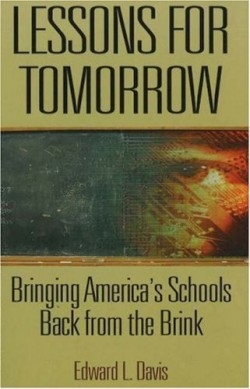Lessons for Tomorrow
Bringing America&8217;s Schools Back from the Brink
Pedagogical Permutation: Theories about formal education have existed since Socrates introduced his method and Plato founded his Academy. From these sages to the Latin-Christian ideals of Augustine; the Renaissance thinking of Descartes, Locke, and Newton; the progressive American devotion to education for all; and the reforms of Dewey and Montessori, the relative merits of various educational styles have been continuously debated by scholars, educators, and scientists.
Now comes Edward L. Davis, who applies cognitive science to learning design in Lessons for Tomorrow: Bringing America’s Schools Back from the Brink (Orgone Press, 288 pages, softcover, $17.95, 0-9769661-0-7). He advocates building an entirely new system upon education’s first foundations, because, as he says, “the way Socrates taught is consistent with what research on cognition tells us about learning. As he saw it, we begin to learn by first uncovering our presuppositions of knowing and our habits of understanding.”
Davis, a former high school teacher and corporate trainer who launched the Electronic University Network, provides a concise history of educational theory and a close examination of the current American educational system. He concludes that it doesn’t need repair; it needs to be completely rebuilt with a new architectural design. His chief criticism is that students do not participate actively in their own learning, and he offers seven “prime directives” towards a “new learning architecture,” such as: “Learning is demand driven, not supply driven.”
The book’s structure reflects its philosophy, starting with understanding society’s presuppositions about education, and proceeding through questions about the future of schooling. Davis refers to comprehensive research, from brain-based learning scientists like D.N. Perkins and Ellen Langer to innovative educational philosophers like Alfie Kohn and Howard Gardner. His writing style is friendly, and his chapters are organized clearly, each ending with a succinct summary.
An impressive blueprint for the future of American education.
Reviewed by
Karen McCarthy
Disclosure: This article is not an endorsement, but a review. The publisher of this book provided free copies of the book to have their book reviewed by a professional reviewer. No fee was paid by the publisher for this review. Foreword Reviews only recommends books that we love. Foreword Magazine, Inc. is disclosing this in accordance with the Federal Trade Commission’s 16 CFR, Part 255.

